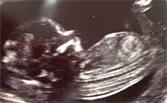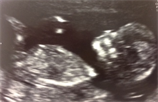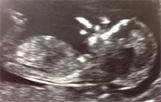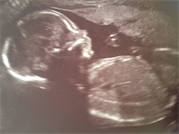Booking your obstetric ultrasound examination
Your midwife will request your first scan and an appointment letter will be sent to you. Alternatively, if you are over 12 weeks pregnant, you may be phoned to offer you a short notice appointment.
If you have any queries you may phone the number below.
Booking line opening times: Monday-Friday 08:30am - 5.00pm
Booking telephone number: 01604 545636 Option 1
How to find us
The ultrasound department is located within Radiology (area D) at Northampton General Hospital
Click here for the hospital map
Obstetric (pregnancy) screening scans
The department offers two screening tests during pregnancy in accordance with the national fetal anomaly screening programme.
https://www.gov.uk/guidance/fetal-anomaly-screening-programme-overview
Screening test for you and your baby patient leaflet – link below
https://www.gov.uk/government/publications/screening-tests-for-you-and-your-baby-description-in-brief
The scans are offered to all pregnant women but they are not compulsory. Consent for the examination will need to be given before the examination can take place , and staff will be happy to answer any questions to ensure that the parents understand what is going to happen and possible outcomes.
Dating Scan



View Gallery
The main purpose of this scan is to:
- Check how many babies there are and that they have heartbeats.
- Check that the basic anatomy of the head, body and limbs appears normal for this stage of pregnancy.
- Measure baby from head to bottom to “date” the pregnancy and determine a due date.
Combined Screening/Nuchal Translucency (NT)Scan
If the pregnancy is “dated” between 11+2 and 14+1 weeks you will be offered combined screening for:
- Down’s, Edwards’ and Patau’s syndromes
- Down’s syndrome only
- Edwards’ and Patau’s syndromes only
In addition to the measurement of the length of the baby a measurement of the fluid and membrane behind the baby’s neck (NT) is measured. You will then need to have a blood test after the scan. The blood test in combination with the ultrasound results and some personal details such as age will then provide you with a risk factor of the baby having one of the syndromes.
If the pregnancy is “dated” between 14+2 and 19+6 weeks or it has not been possible to measure the NT then you will be offered the Quad test which screens for
This also involves a blood test after the scan or an appointment will be made for a suitable date.
The 18-20+6 week fetal anomaly scan

View Gallery
The main purpose of the scan is to look for physical abnormalities in the unborn baby. The scan will look in detail at the baby’s bones, heart, brain, spinal cord, face, kidneys and abdomen.
We usually learn that the baby appears to be healthy and developing well, but sometimes we find a problem. If this happens the findings will be explained to you and follow up appointments will be arranged.
Scans are not guaranteed to find all problems. Sometimes we have to say there might be a problem, but we cannot say for certain. In a small number of cases, babies are born with abnormalities that were not spotted by the scan.
Sometimes it is difficult to get a good picture if the baby is lying in an awkward position, is moving around a lot or if you are above average weight; this does not mean there is anything to worry about.
Frequently asked questions
1. Can this scan harm me or my baby?
There no known risks from having an ultrasound
2. Who can come in the scan room with me?
We recommend that you bring a partner, a friend, or a family member when you have the test because you might be anxious. We suggest that if possible, someone should accompany you to and from the hospital.
We do not allow children into the scan rooms.
3. Do I need to bring anything with me?
Antenatal notes (green notes) need to be brought to every scan or the scan cannot be performed.
The notes contain all the medical information and documentation the Sonographers are required to see before undertaking the scan so the scans cannot take place without them. Also if we identify a problem that requires us to refer you directly to another department or consultant they will need your notes.
4. Can I bring children into the scan room?
No. Radiology has no child care provisions within the department, and in accordance with the national recommendations children cannot come into the scan room.
Remember, an ultrasound scan is an important medical examination, and it is treated in the same way as any other hospital investigation.
5. Can I bring more than one adult into the room with me?
No. We allow one adult in the room with you, both due to lack of space but also due to the fact that this is a medical examination that requires a great deal of concentration to ensure the accuracy of the findings. As the baby is shown and findings discussed throughout the duration of the scan there is not an opportunity for people to swap over during the scan either.
6. Why is my appointment after the time frame for the combined screening?
Appointments are booked using the information given on the request from your midwife and we try to book all appointments in the relevant timeframe. However, if there were no appointments available in the timeframe required you will have been given the next available appointment. The department does have a cancellation list that is used when patients need alternative appointments. If your appointment is not in the correct timeframe you will automatically go on the cancellation list but you can also request to go on the cancellation list as well.
7. What happens if I am on the cancellation list for an alternative appointment?
Booking team staff will contact you if an appointment becomes available. Please ensure that you have given your midwife your correct phone number and that you answer calls that may come from unknown or withheld phone numbers in this time period.
8. What will happen when I go into the scan room?
Obstetric scans are carried out by specially trained staff called Advanced Practitioner Radiographers/Sonographers.
In order for the Sonographer to get good images of your baby, the procedure is carried out in a dimly lit room.
You will first be asked to lie on a couch. You will then be asked to raise your top to your chest and lower your skirt or trousers to your hips. Tissue paper will be tucked into your clothing, to protect it from the ultrasound gel which will then be put on your tummy. (The gel makes sure there is good contact between the machine and your skin.)
The Sonographer then passes a hand-held device called a probe over your skin. It is this probe which sends out ultrasound waves and picks them up when they bounce back.
The Sonographer will carefully examine your baby’s body. Having the scan does not hurt, but the Sonographer may need to apply slight pressure to get the best views of the baby.
A black and white picture of the baby will then be seen on the ultrasound screen.
9. How long will my scan take?
A scan usually takes around 20-30 minutes.
However, the Sonographer may not be able to get good views if
- Your baby is lying in an awkward position or is moving around a lot.
- If you are above average weight, because the quality of the image can be reduced meaning there is more tissue for the ultrasound waves to get through before they reach the baby.
If it is difficult to get a good image, the scan may take longer, or have to be repeated at another time but this does not mean there is anything wrong with the baby.
10. How will I get the results of this scan?
The Sonographer will tell you the results at the end of the scan.
11. Can I find out whether my baby is a boy or girl?
Fetal sexing is not part of the screening programme but we will let you know what the baby appears to be at the end of the examination if we are able to see. However it is not always possible to tell and is not a 100% guarantee. This information will be given verbally to the patient but will not be given in writing.
12. Can I buy photos of my baby?
Scan photos can be purchased at the time of the examination. The payment machine does accept cash and card payments. One image costs £5 and three copies of the image costs £10 (January 2018).
13. Why does my photo not look as clear as other peoples?
The photos will differ for a number of reasons but the main reasons that the images may be less clear are:
- Your baby is lying in an awkward position or is moving around a lot.
- If you are above average weight, because the quality of the image can be reduced meaning there is more tissue for the ultrasound waves to get through before they reach the baby.